Following comprehensive 'once-in-a-generation' migration reviews undertaken in 2022 and 2023, the Government promised to 'get the right skills in the right places' and ensure Australia meets its skills needs in coming decades.
In the past 2 years, employers have seen the emergence of niche and industry-specific visa pathways, such as the Aged-Care Labour Agreement, and new Designated Area Migration Agreements (DAMA's) for regional migration.
However, major changes that would more broadly assist employers are yet to be implemented, such as replacing the TSS (Temporary Skills Shortage) 482 Visa with the new Skills in Demand Visa, which will reduce Labour Market Testing (LMT) requirements and enable faster visa processing for highly paid migrants.
Recently at the 2024 WA HR Leadership Summit, Sheila Woods, Managing Director of Interstaff, explored the challenges of developing sustainable global talent strategies while the Government continues to navigate complexities to 'get the right skills in the right places'. Here are our insights.
Why are we yet to see skilled visa reforms that have been promised for some time?
It seems the Department of Home Affairs' focus has been on establishing recommended 'guardrails' to develop 'integrity' mechanisms in the migration program including:
- Strengthening employer compliance legislation with heavier penalties for non-compliance
- Improving vulnerable migrant worker protections and establishing a Workplace Justice Visa
- Providing sponsored workers with work rights flexibility after leaving their sponsoring employer (changing conditions applied to Subclass 482 Visas)
This has been accompanied by an increase in monitoring and enforcement activities by the Department. As you can see below, "awareness activities" were on track to double in March in the last financial year, and infringements had doubled by the end of March 2024. It is likely this will continue next year and possibly include a shift towards sanctions as new laws are tested.
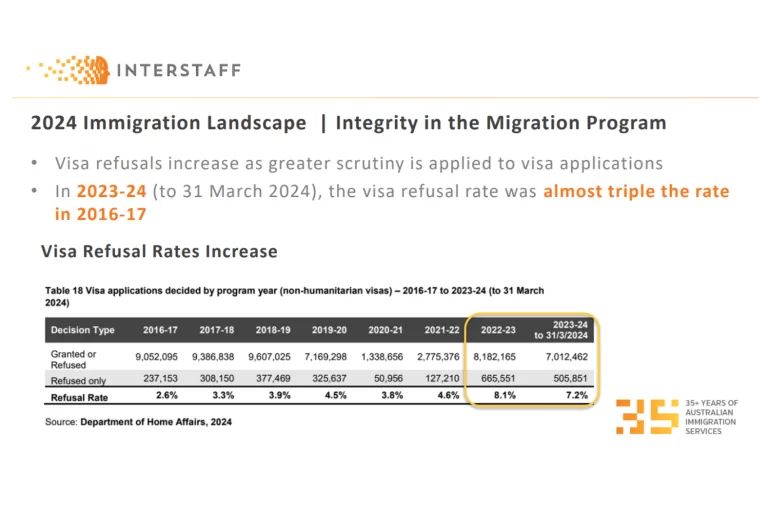
Another trend has been a significant increase in visa refusals, which has been much higher than pre-COVID levels. This has impacted the Student Visa stream in efforts to reduce net overseas migration numbers, most probably in response to the housing availability and cost of living crises.
What has already changed and what is yet to come?
Below is a recap of priorities established 2 years ago at the Jobs and Skills Forum that have already been implemented.
- Permanent Residence (PR) pathway changes: 186 Visa Transition Stream 2023
- TSMIT increased in 2023 and 2024
- 'Strengthening Employer Compliance' law – 1 July 2024
- Subclass 482 Visa condition change (180 days instead of 60 to find new employers and more flexible work entitlement)
- Student Visa reform to stop 'visa hopping'
- Graduate Visa age reduction (35 years)
- Business Innovation and Investment program closed
- 408 COVID visa closed
Here is a summary of skilled migration changes that are yet to come and are expected to be implemented in late 2024:
- Skills in Demand Visa (Temporary tiered migration system to replace Subclass 482 Visa)
- Skills Occupation Lists that may apply to the 'Core Skills Stream' of the Skills in Demand Visa
- Salary Indexation (how this differs from current and historical arrangements)
The laws governing these changes are pending parliamentary process with a review due by 2 September 2024.
Below we will explore each of the above changes and associated challenges for employers and migrant workers in greater detail.
Transition to a Tiered Skilled Temporary Visa System via the Skills in Demand Visa
A major way that the Government is seeking to fulfil its promise to employers to "get the right skills in the right places" is by reforming temporary skilled visas – particularly Employer-Sponsored Visas because they link new migrants directly to jobs and a network in Australia and efficiently introduce skills to the country.
The new Skills in Demand Visa will replace the Subclass 482 Visa and introduce a tiered skilled temporary visa system.
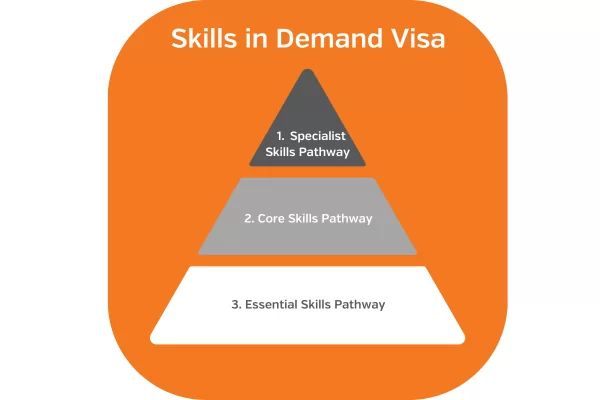
The New Skills in Demand Visa:
1. Specialist Skills Pathway
- Specialist Skills Income Threshold (SSIT): $135,000*
- Any occupation except trades, labourers, truck drivers
- 'Light touch', 7 day priority processing
2. Core Skills Pathway
- Core Skills Income Threshold (CSIT) $73,150*
- Core Skills Occupation List (CSOL)
- 21 day processing
3. Essential Skills Pathway
- Subject of ongoing consultation
- Jobs paying less than $73,150*
- Next year (2025 – To be Confirmed)
- To address/service areas of persistent shortage*Rates to be indexed annually.
Here are some of the main changes we can expect from the transition to the Skills in Demand Visa. The first 4 items have been confirmed by the Department of Home Affairs.
- Visa Term – 4 years (all streams)
- Labour Market Testing
- Conduct within 6 months instead of 4 months
- Salary Levels to be set out in the Migration Act 1958 and indexed annually
- Occupation Lists
- Core Skills Occupation List (CSOL) yet to be finalised – Jobs and Skills Australia
- Work Experience
- 1 year instead of 2 years post qualification – 23 November 2024
- Nomination Training Contribution Charge (NTCC)?
- To be paid monthly as a trailing fee? When?
These changes could potentially raise several challenges for employers and skilled migrants such as:
- Will Subclass 482 Visa holders be able to use time with any employer, not just time with the current sponsoring employer (as is the case now) to apply for PR?
- If Subclass 482 Visa holders need to renew their visa, will their occupation be on the list for the Core Skills Pathway if they are paid less than $135,000?
- Will their salary meet the indexed amount at 186 PR and/or Skills in Demand Visa renewal time?
- When will the independent pathways enable 'self-nomination' for PR?
Employers and skilled migrants should be aware of these potential challenges – we will certainly keep you updated as further details emerge.
Skilled Occupation List Changes Under the Skills in Demand Visa
Another upcoming change for employers and skilled migrants will be the way in which skilled occupation lists will be used in the new Skills in Demand Visa, re-defining which occupations will be eligible for temporary work in Australia.
A statutory authority, Jobs and Skills Australia, has been established to advise on the Core and Essential Skills pathways of the Skills in Demand Visa. This informed approach is another way in which the Government plans to deliver the right skills to the right places.
Jobs and Skills Australia has developed a Skills Priority List to track skills in shortage across the economy. Below you can see a snapshot of part of the Skills Priority List. It will be interesting to see how agile and responsive Jobs and Skills Australia will be to changes in the labour market and the economy.
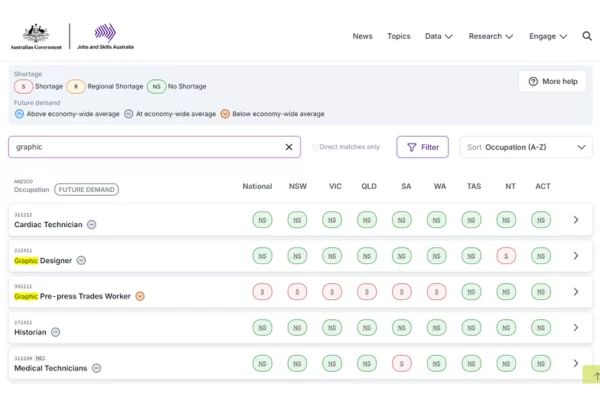
Jobs and Skills Australia has also released three Draft Core Skills Occupation Lists (CSOL):
- Confident On List (occupations that may remain on the list)
- Confident Off List (occupations that may be removed)
- Consultation List (occupations open for consultation)
Jobs and Skills Australia will provide final advice to the Government on the proposed final CSOL, but it is worth noting that some skills that have previously been supplemented by the skilled migration program have been flagged for removal, such as IT Support roles.
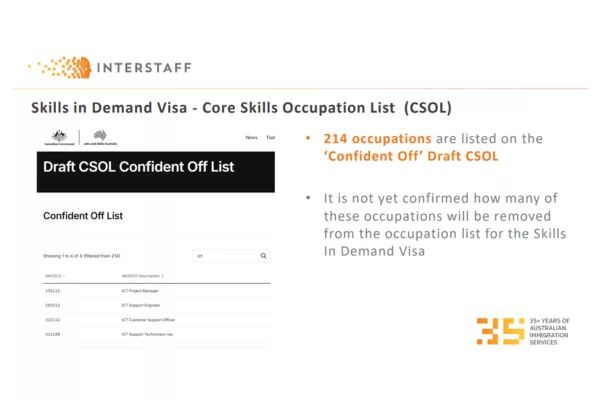
Below is a snapshot of the CSOL Targeted for Consultation list. 307 occupations have been targeted for further feedback from labour market surveys and independent research. This included several mechanical occupations, which Jobs and Skills Australia identifies are in national shortage.
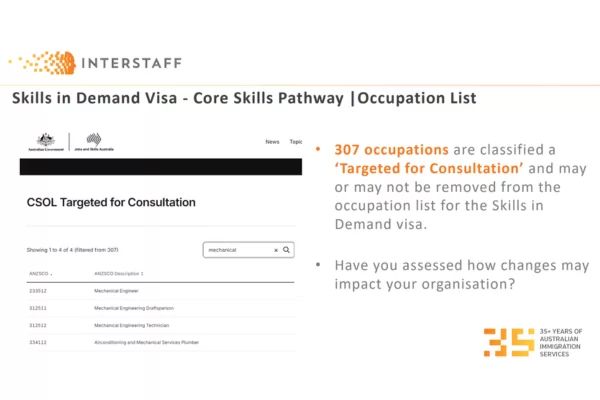
Employers and skilled migrants should consider how skilled occupation list changes may impact both their temporary skills for new employees, and Permanent Residence (PR) needs for current employees. It will be interesting to see what the finalised list will include, however we are yet to receive a date for when this change will occur.
Annual Indexation of Salaries Under the Skills in Demand Visa
Another key change for employers and skilled migrants is salary indexation. The Government proposes an annual indexation of the Skills in Demand Visa salary thresholds in line with Average Weekly Ordinary Time Earnings (AWOTE). As a result, employers will need to account for minimum salary requirements increasing each year when planning visa renewals and PR.
However, it is worth noting that this change is yet to be confirmed. The Bill is currently at the Senate Legal & Constitutional Affairs Committee for review. Many submissions to the Committee have since criticised the indexation mechanism, which could result in two remuneration systems over time. We should know more about the indexation system after 2 September 2024.
As the indexation may be legislated in the Migration Act rather than in Migration Regulations, minimum salary requirements for sponsored visa holders are likely to be more rigid and less flexible because it will require parliamentary processes to amend and accommodate market changes.
In contrast, amendments to Migration Regulations or Legislative Instruments would enable more flexible responses to market conditions.
For context, below is the change in AWOTE in the past 11 years, indicating the level of salary adjustments employers may need to consider when sponsoring migrant workers.
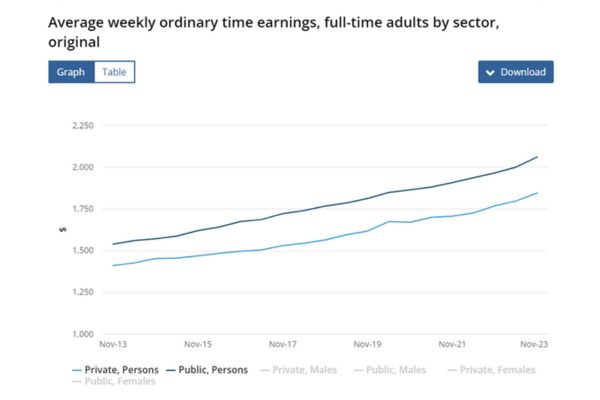
Source: Australian Bureau of Statistics
Here's our insights on how to plan for annual salary indexation to remain compliant as a sponsor of visa holders.
- Be aware of the thresholds and when they change each year
- Accommodate these into remuneration and performance review processes to manage increases for:
-
- Transitions to PR (if applicable); or
- Visa renewals (for example, for Short-Term 482 Visa holders)
Strategies for Global Talent
Until changes are rolled out, it may be difficult for employers to take action without knowing the finer details of the changes that will be implemented. We will certainly keep you updated on the changes, but in the meantime our team at Interstaff recommend:
- Preparing for Skills Occupation List changes by reviewing:
-
- Occupations that may become eligible (added to the list)
- Ineligibility (occupations removed from the list)
- Reviewing current visa holders' eligibility for:
-
- PR pathways
- Salary expectations
- Keeping your eyes peeled for updates on upcoming visa changes – for example, the commencement of the Skills in Demand Visa. Sign up for Interstaff's newsletter, e-guide and insights at www.interstaff.com.au/visa-tools-for-employers/
As always, should you have any queries regarding immigration changes, we encourage you to get in touch with Interstaff's Migration Agents and Immigration Lawyers for professional advice.
You can also connect with us on LinkedIn to stay updated on Australian immigration news and developments.
Skills in Demand Visa Transition | Source:
Interstaff's Registered Migration
Agents
Department of Home Affairs
Jobs and Skills Australia
The Australian Bureau of Statistics
The Migration Institute of Australia
The content of this article is intended to provide a general guide to the subject matter. Specialist advice should be sought about your specific circumstances.

